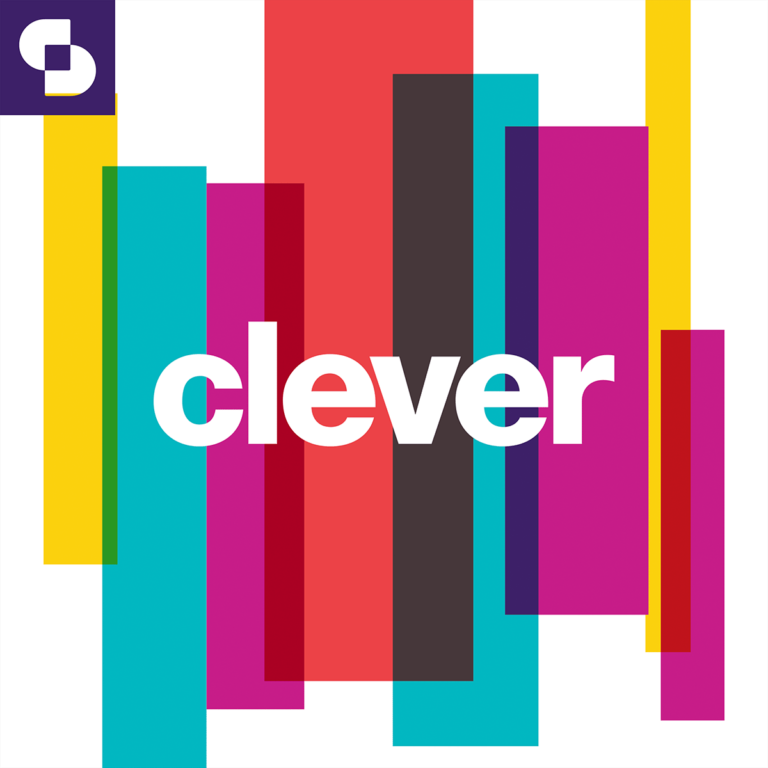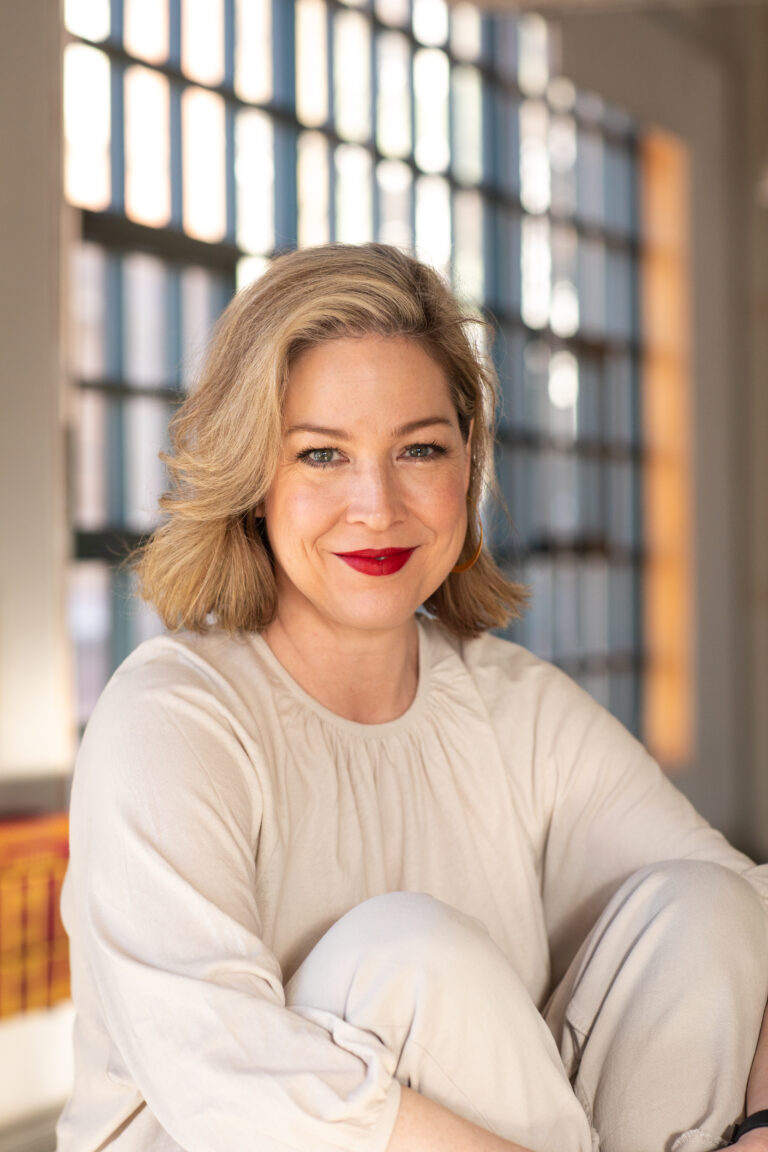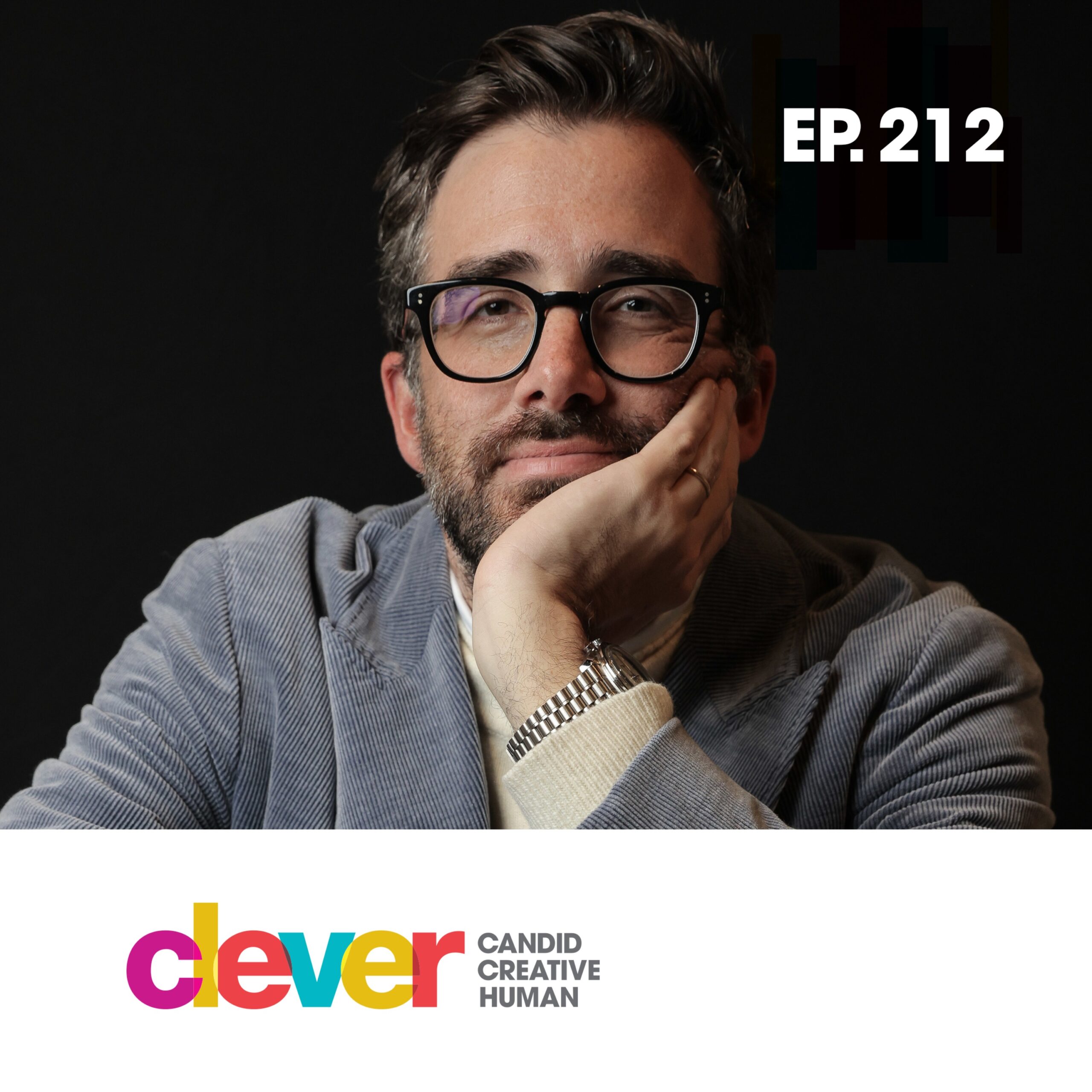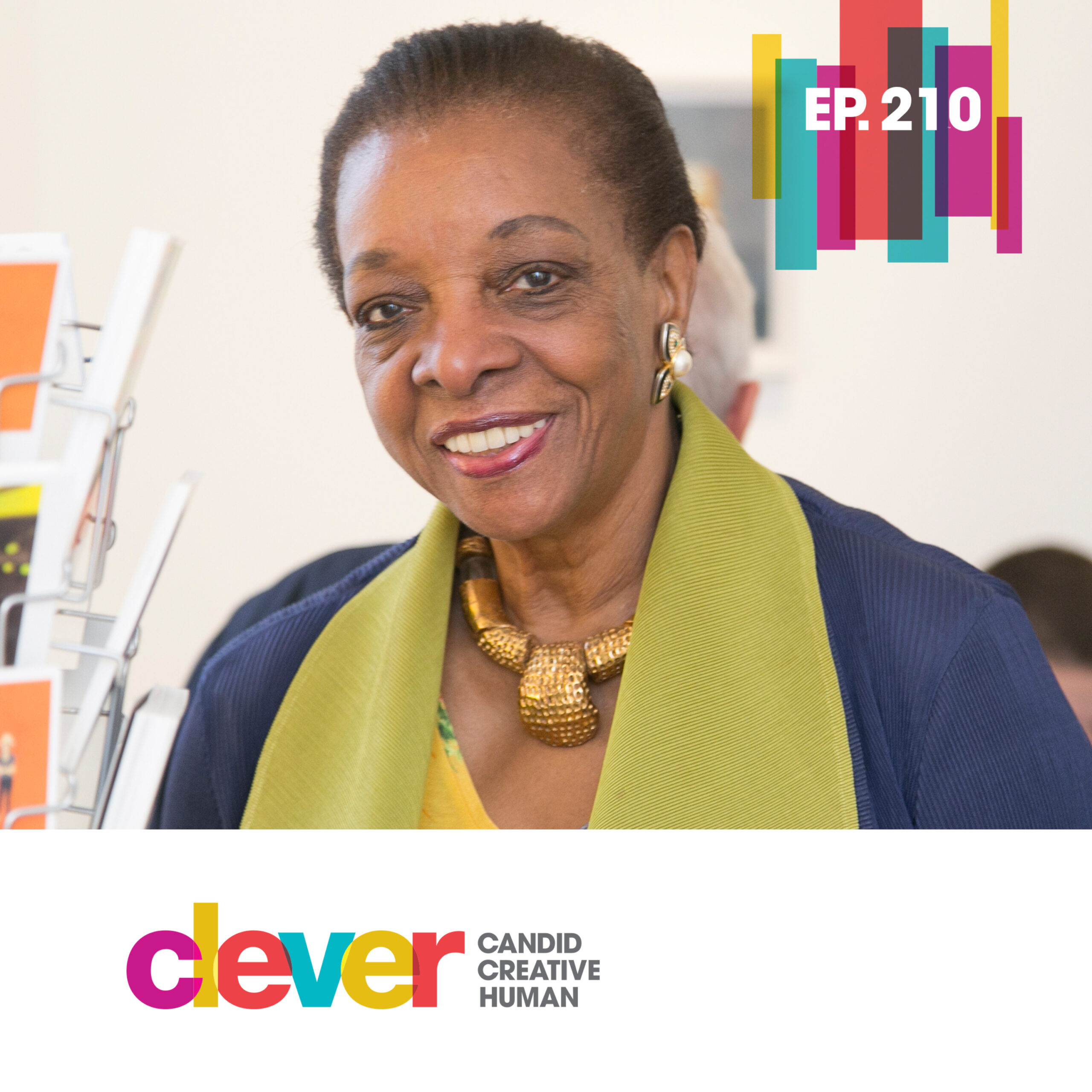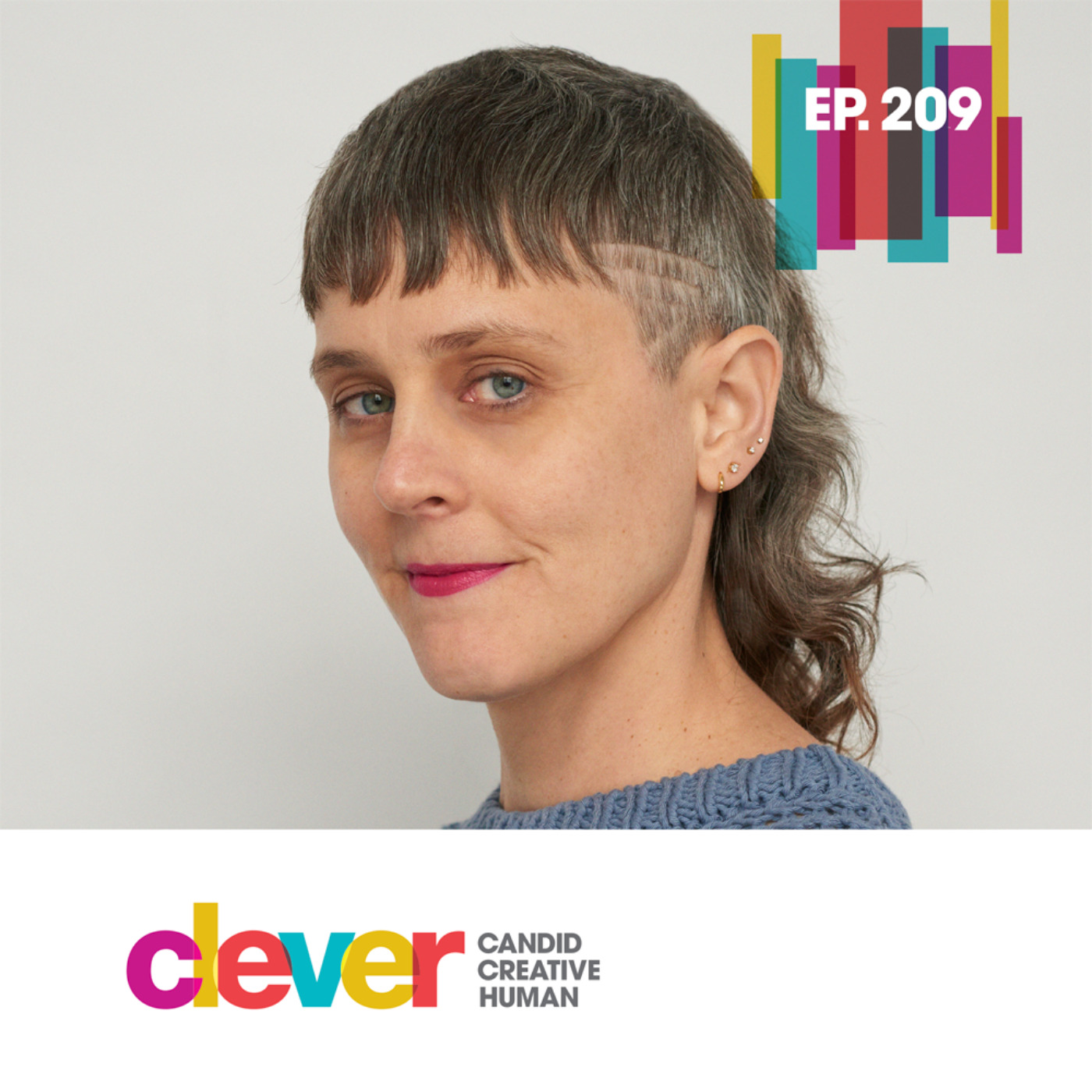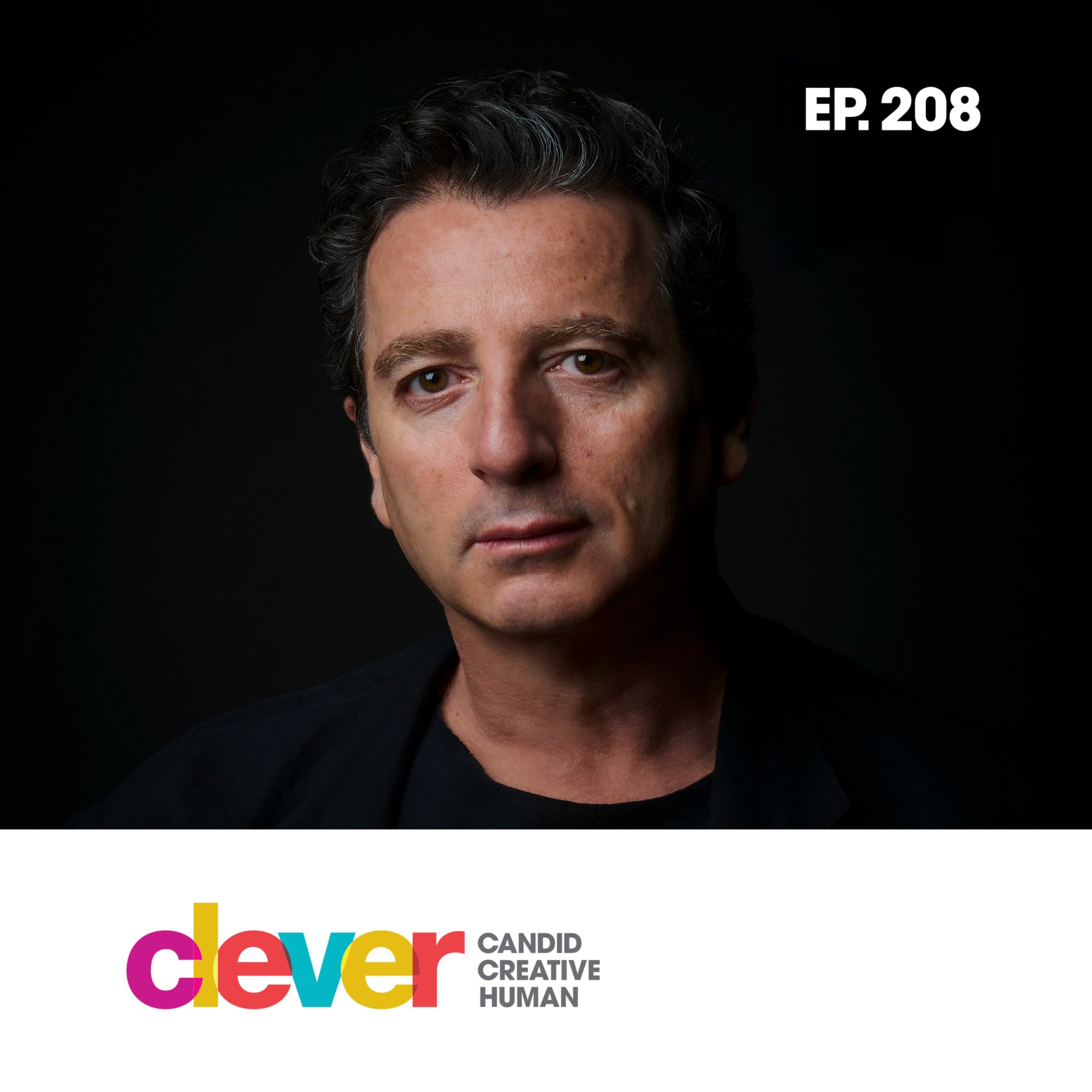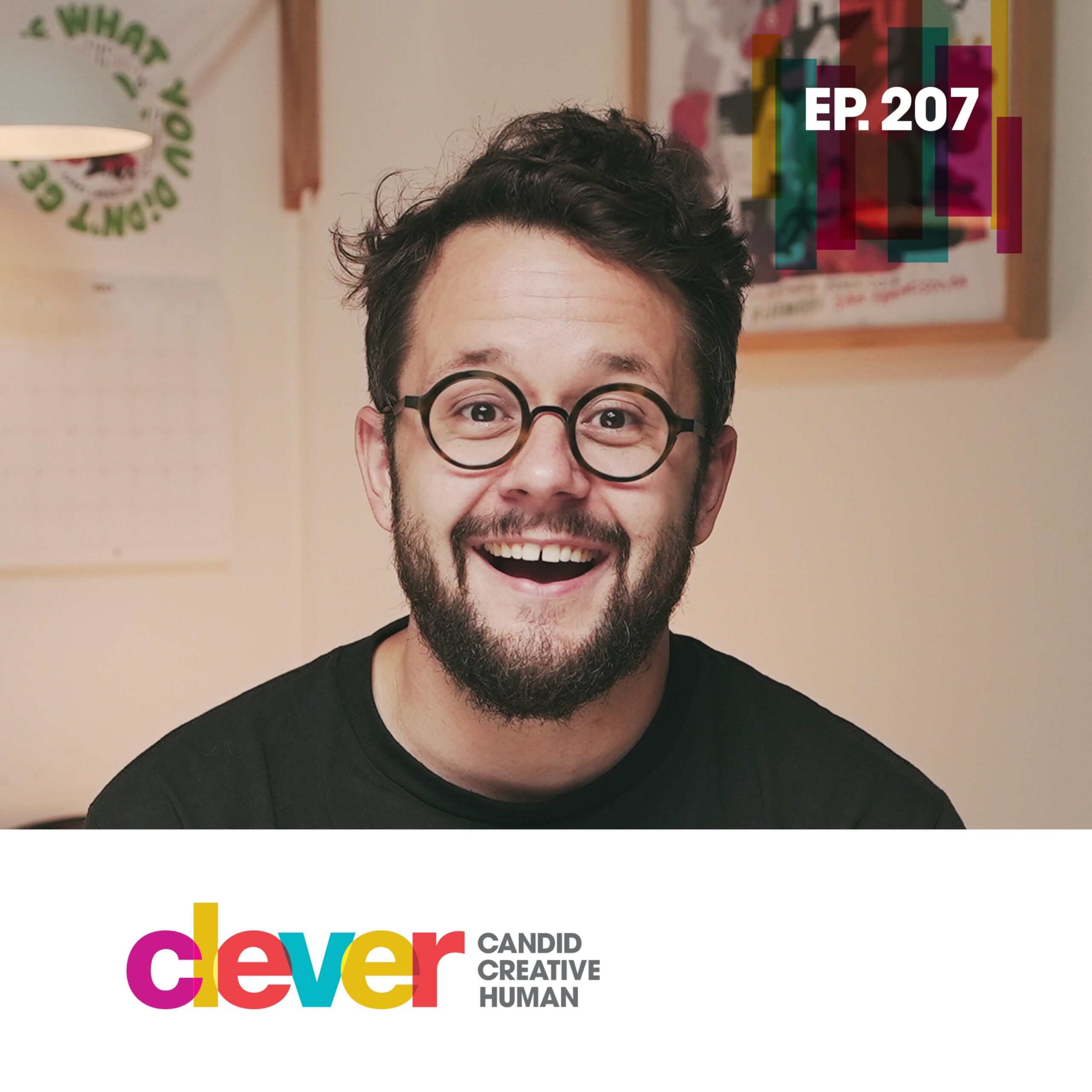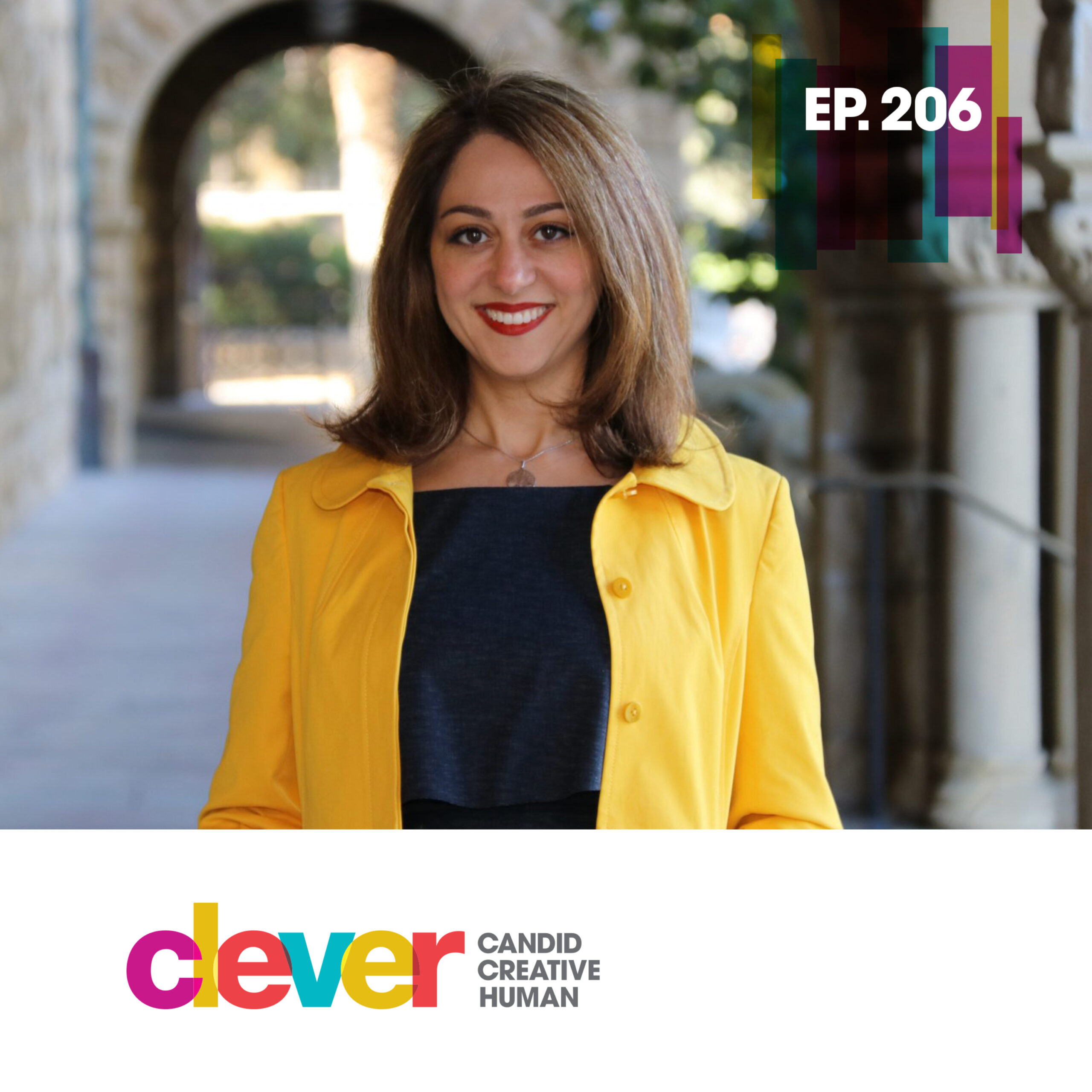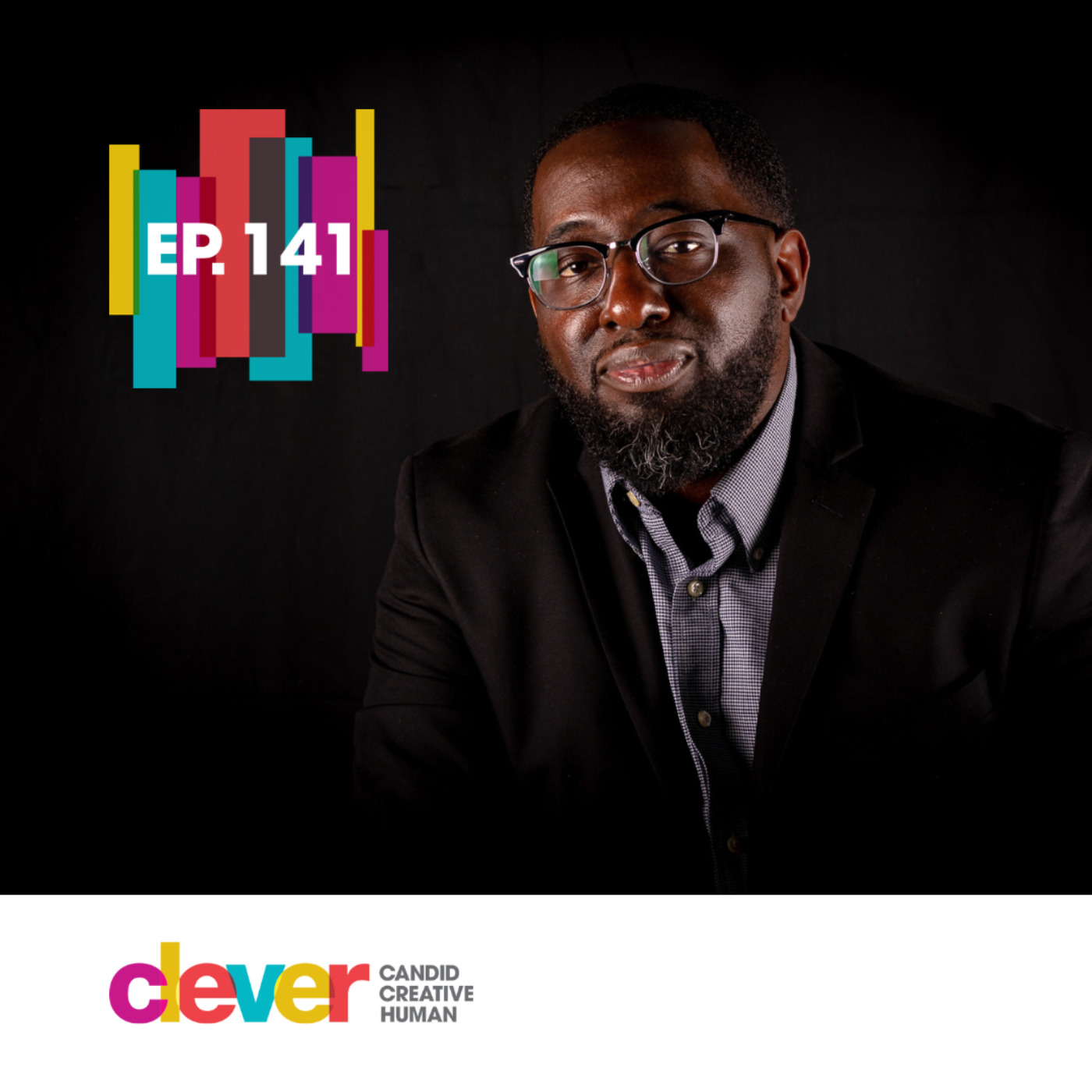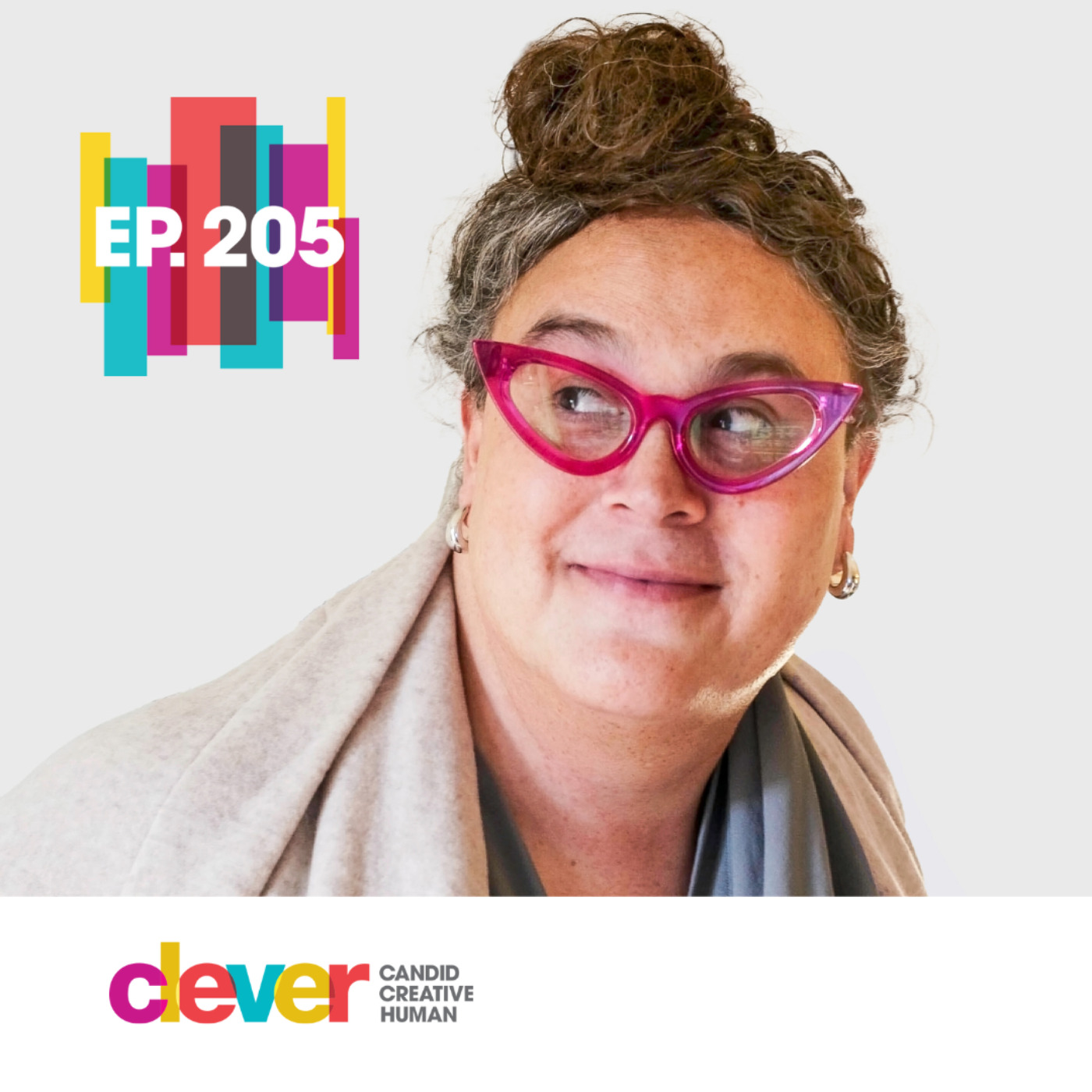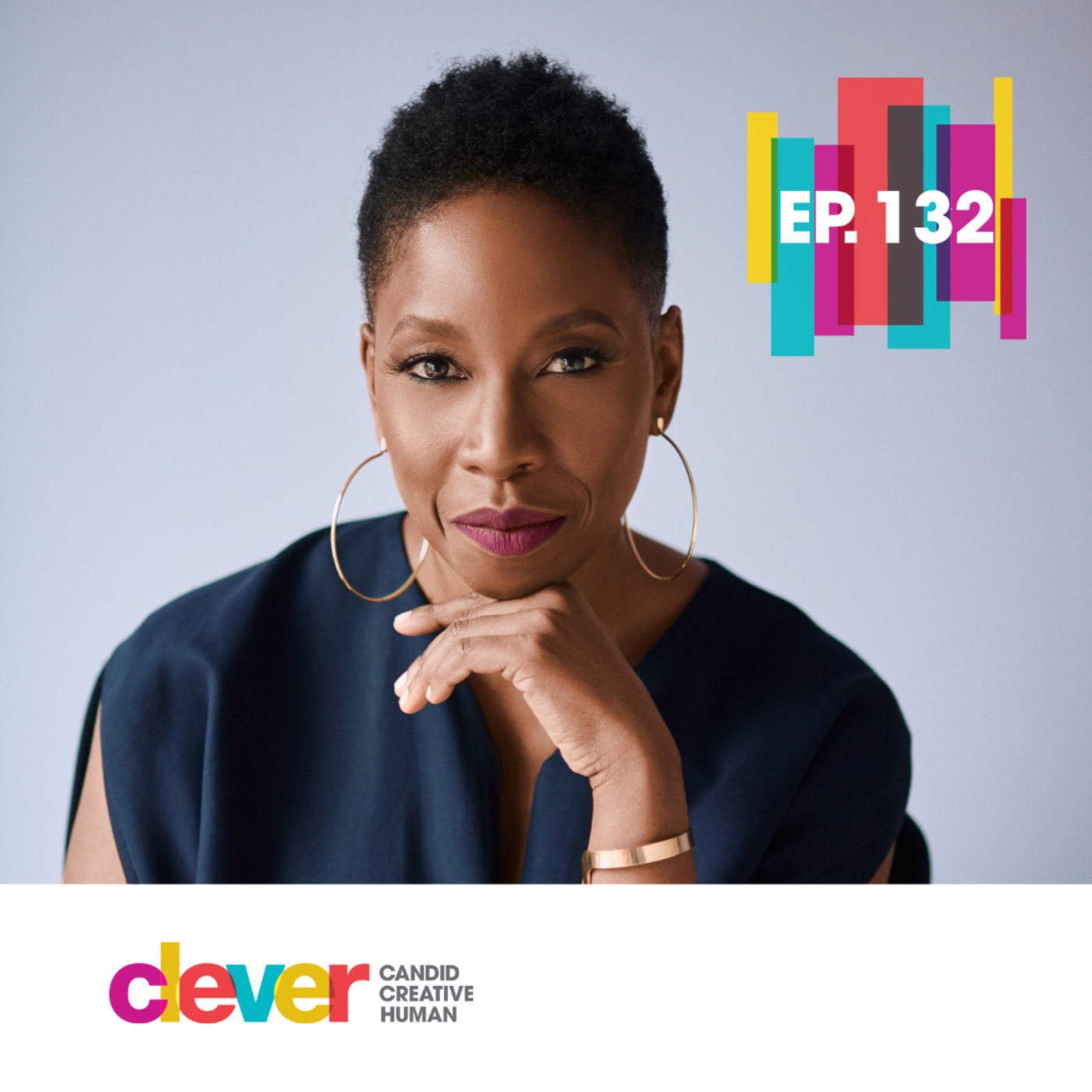Sound Designer Dallas Taylor picked up the trumpet in grade school and a whole new world opened up. After a debilitating chapter, he needed to find a new way to translate his love of sound into a profession. He went from music to recording, and into post-production for TV and film. Now he’s the creative director of his leading sound design studio, Defacto Sound, and the host of a lovingly crafted (and very popular) podcast, Twenty Thousand Hertz, about the stories behind the world’s most recognizable and interesting sounds.
Images and more from Dallas Taylor on cleverpodcast.com.
Listen to Twenty Thousand Hertz!
Please say Hi on social! Twitter, Instagram and Facebook – @CleverPodcast, @amydevers,
If you enjoy Clever we could use your support! Please consider leaving a review, making a donation, becoming a sponsor, or introducing us to your friends! We love and appreciate you!
Clever is hosted & produced by Amy Devers, with editing by Mark Zurawinski, production assistance from Ilana Nevins and Anouchka Stephan, and music by El Ten Eleven.
Dallas Taylor: Big thing I think about a lot is do I love the moment-by-moment or do I love what I’m hoping the outcome will be? And so that’s a question I’m asking myself constantly.
Amy Devers: Hi everyone, I’m Amy Devers at this is Clever. Today I’m talking to Dallas Taylor. Dallas is a professional sound designer, and host of the award-winning podcast Twenty Thousand Hertz – a lovingly crafted show that explores the stories behind the world’s most recognizable and interesting sounds. If you’ve yet to listen, I encourage you to add it to your queue – Each episode is a joyful and fascinating little vacation into the world of sound that will leave you listening to the world around you in richer detail. The podcast won Best Production & Sound Design at the 2022 Ambie Awards (the Oscars of podcasting), and it was the People’s Voice winner for Science and Education Podcast at the 2020 Webby Awards, which honor excellence on the internet. In addition to Twenty Thousand Hertz, Dallas is also the founder and Creative Director of Defacto Sound, where he has led thousands of high-profile projects ranging from blockbuster trailers and advertising campaigns to Sundance award-winning films and major television series. Just to give you an idea – In 2021, Defacto worked on more than 800 Netflix trailers (including for the megahits Squid Game and Ozark) and more than 100 HBO trailers for such programs as Game of Thrones and Harry Potter: Return to Hogwarts. A self-described sound evangelist Dallas is a sought-after speaker at conferences, a regular contributor to major publications, and a respected thought leader on the narrative power of sound. He’s also a genuinely warm, interesting and thoughtful person with a powerful story. I could’ve talked to him for hours. Here’s Dallas.
Dallas Taylor: I’m Dallas Taylor and I work in the Cloud and I’m a sound designer and podcast host of a lovingly crafted podcast called Twenty Thousand Hertz.
Amy: Big fan! I always like to learn how you got to be the you that you are today by going back to the you that you were. Can you talk to me about what it was like growing up and what your hometown, your family dynamic, things that made impressions on you as a child?
Dallas: I great up in the Mississippi Delta, on the Arkansas side. So in and around Memphis, Tennessee, so a very poor area. I didn’t really have, a super close-knit family. They worked a lot, to provide. And I wasn’t really great at anything in school in particular. At the time I didn’t gravitate toward grammar or writing or history or math or anything. But when I was in 6th grade I learned of band and I went in and I tried the percussion, because that sounded fun. And then I tried the French horn, which I adored, and I still adore. But eventually landed on the trumpet. And that was really the turning point in my life into this whole world of music and sound, because miraculously, and I have no idea why, I was extremely good at it. And it was the way that I expressed myself, was through that trumpet.
Amy: Can we unpack that a little bit? I think it’s amazing that you’ve found your love of sound in 6th grade, that’s a nice formative year to find it and be able to work on it. But what was it like to sort of surprise yourself with being a trumpet prodigy, with a talent you didn’t even realize you had, that grew so quickly? I’m not saying you didn’t work at it, but because it came to you in such a fluid and intense way. What was that like and did it feel like you were swept up in a river?
Dallas: At the time I really didn’t know what to think about it, at that age. I’ve spent the rest of my life really analyzing that moment and I think even today I’m discovering what was happening in my mind then. I remember, maybe it was first-second-third grade, taking some sort of ‘how do you learn’ test in school. I remember I was a very strong oral learning, which means through the ears. I always had difficulty reading text and I still do today and so most of the way that I consume information is through my ears and conversation. And that must have something to do with it, because I’ve always had this very strong sense of hearing and emotion towards music and I listen to such a huge wide range of types of music and I did at the time too. It felt like it was this thing that I didn’t have to speak to really communicate what I felt. Because I was very quiet, like a very shy kid. I didn’t talk a lot. And I remember that was like this outlet where it was so encouraged to feel music and perform it. And it wasn’t something that I was like demeaned for it or anything. It was like in this really poor, tiny, small town of Hughes, Arkansas. Somehow I had a band director who just absolutely just loved music and just encouraged me in these really incredible ways and went out of her way to nurture me in that. And at the time I just didn’t know what was happening, but then looking back, it’s so clear how many people in my life saw that little spark, from a kid, that could easily be, I don’t know, doing meth or going into a direction that I don’t think they knew. I think I wanted to be a trumpet performer, but I think that they just saw some sort of spark and they go, okay, I think that this kid might be able to go and do and communicate in some way. And it was really special. At the time I was very aloof, I just remember being really good at it and enjoying it. I didn’t have any nerves or anything, it came to me very comfortably. I had all of my friendships revolved around band. All of my after school activities and that just led all the way through middle school into high school. I was involved in all region and all state and met all these kids from all over the state that were very like-minded. And ultimately that was the thing that took me into college.
Amy: Yes, so being so good at the trumpet was your ticket out of that small town and…
Dallas: Absolutely.
Amy: As an oral learner, did you also find there was an embodied piece of playing the trumpet that really resonated with you, like the coordination of breath and finger movement, like an athlete, did that sort of come to you in a way that felt organic and natural?-
Dallas: Definitely once I started in high school and started to perform at a much higher level. I’ve always been really fascinated with classical music and it tied me in a way to history and understanding what was going on at the time, in order to play these pieces. And I definitely miss the times of just that non-verbal thought that’s just all in sound and performance and like playing a trumpet solo, of some like, Stravinsky piece over this big orchestra and it’s just this feeling of camaraderie and just this inner/outer body experience of enjoying this music from hundreds of years ago. And for sure this just physical resonance between brain and body and breath and vibrations…
Amy: Yeah.
Dallas: I know that sounds very, kind of over the top, but I think anybody who has ever been in band or choir or any sort of musical aspect can understand that, it’s bigger than yourself by a long shot.
Amy: I think even if somebody is not a musician, but they’ve been to a concert that really resonated with them and they’ve been in a space with other people vibing all together in syncopation and in synergy with the instruments, but also with the… just collective energy of the space. It’s quite intense and I think one of the highs of being a human.
Dallas: Oh, for sure, yeah.
Amy: So the trumpet was not only something that you were gifted at, but it was also a kind of road to college and a social avenue. And a way for people to invest in you that I’m sure felt good, but it puts a lot of pressure on you too in a way that you might feel responsible for not letting them down after they’ve invested in you.
Dallas: That idea of people relying on me didn’t catch up with me until my third year of college. I had a new trumpet teacher come in and we were making changes to the way that I played. I think simultaneously I started to understand how much relied on… like if I’m playing a solo, or kicking off Pictures at an Exhibition, which is this really famous piece that starts out with like pum-pum-pum, para-pum-para-pum-pum-pum… and it just keeps going and going and going. It’s not even a hard piece. It’s something that I think any trumpet player can play. But the pressure of the trajectory that I was going on, thinking, okay, I’ve got to play this in a symphony hall with a lot of people watching, with all of my peers. As I’m going up the ranks in college, all of the performers are getting better and better and better. So when I’m in middle school, the gap between me and everyone else is so much that I didn’t feel nerves. But as that gap got closer and closer, I started to realize how serious everyone was taking it and that a simple… at least in my mind, like a simple fracking of a note or nerves kind of getting a little bit too high, I started to realize, oh, I’m right on the bleeding edge of disappointing people. And if you think about the muscles and your lips and around your lips, they’re so tiny and they’re so sensitive and they’re just so easily manipulated. And if you have… anything you feel comes right out of this bell in a very loud way. And so in my third year of college, something I’ve been struggling with, I remember going to the doctor and talking about, this is creeping up, not really getting a lot of help for that. And then there was a concert where we were opening a new hall, it was like this multimillion dollar beautiful facility at the school. It was the wind symphony, which was always my favorite place.
And I was in the middle of a concert and I had a big solo, just me for a good chunk of time. Not too challenging, but about a minute before it happened, I started sweating profusely and the second chair trumpet player, very supportive, she kind of leans over, and she’d never done this before. And she was like, do you need for me to take this solo? She had never played it; she had never done it in rehearsal. But she saw something physical was happening. I’m sure I went white, sweating profusely. All of that culminated in that moment and I totally botched the solo. At the time I didn’t know what happened. Later on I realized it was a panic attack. And from that moment I could not shake that performance nerves.
Amy: Oh, that’s crushing. I’ve had one full-blown panic attack in my life and it’s completely, it arrests your whole system and after you have one, then there’s the fear of having another, that in and of itself is sort of exponential on top of things. If you couldn’t shake the nerves, how did that affect you and it robbed you of the joy of playing, I’m sure?
Dallas: Yeah, so the hardest thing was that my entire identity was in the trumpet. Everyone expected me to go and get a master’s degree at Northwestern or some sort of big trumpet school. I expected that. Everyone was continuing to nurture me. They didn’t have a picture into the struggles that I was having. It got so bad that I couldn’t play a single note when we were going around the room tuning. I remember just the fear of just me playing, just like an open c on the trumpet, which is as easy as it gets. I was just struggling with this crippling anxiety. And so it was a very quick turn there in the last year and a half of school where I was trying to check all the boxes. I know I’m a good performer, but I can’t be in a performance situation where these teeny, tiny muscles give me away. And so I was trying to figure out what can I do to get around that? And at the time I thought a lot about composing music or conducting. And so that’s kind of where it started, right before I pivoted into audio.
Amy: I’m worried about the anxious part of you that wasn’t getting enough help. Because you mentioned that you had went to see somebody and it didn’t seem like they were able to help you. Did that sort of crystalize in your brain as okay, well, this isn’t an option, I’m not going to get over this so I have to go around it?
Dallas: I was much more, at the time, in panic mode.
Amy: Okay.
Dallas: I was newly married. With the trumpet playing, I knew that there was a path to band directing or teaching or something. But it went so suddenly from joy into dread, every time I picked up the horn, that I had to figure something out differently. And I remember at the time, computers were becoming much more capable of creating some level of music. I remember this program called FruityLoops where you could make beats and stuff, and it was so fun to do that, and that opened up a whole world of computer music making. And I loved that. So somehow kind of made it through that last year and a half with anxiety. And I got an internship pointing a camera at a news anchor for a local news station. And the only reason I even did that, because I had no interest in being a camera person. I knew that there must be an audio person within 50 yards of that camera and it was the best shot that I had. So I went and did this immediately, in hopes that the audio person would take me under their wing. He did. He was lovely. I think just any time an audio person sees another person who has this interest and this joy in their eyes of learning about that, they take them under… I think most people want to help. And really that was my start. Simultaneously I was going to recording school, just like a summer course where I could just learn about the basics of signal flow and wires and physics things.
Amy: Okay.
Dallas: Which side note, I learned more about the physics of sound in my first couple of days of recording school than I did in all of music school, which is shocking. I think way more effort should be spent in the physics of sound and how it works, in music school, because there’s so many aspects of how that influences how you perform. But yeah…
Amy: Do you want to elaborate on that?
Dallas: Yeah.
Amy: Tell me about it.
Dallas: One of the biggest things Is like why is it that I can pretty much play, if I’m going to play as a trumpet player within the horn section, with the entire orchestra or wind band playing, I can play at pretty much the same volume and blend into the overall sound of the orchestra. I can play a solo over the top of the orchestra at a similar volume. And what I had learned in recording school, if you’re a trumpet player, if you’re any instrumentalist playing a solo, what you do to your mouth and your body is you’re kind of EQ’ing and brightening your sound because if you think about being in a large room at say a party, what do we do with our voices to try to cut over everyone? You make it higher pitched, you make it kind of tinny sounding, and then it’s really cut over everyone, that’s why your voice hurts after you attend an event like that. So that’s what was happening with the trumpet. I was essentially shaping the mechanisms of my throat and my mouth to brighten the horn sound to where it could cut over the symphony.
Amy: Oh, interesting and that’s just something you sort of do intuitively, like you would in a conversation, but it wasn’t really talked about or deconstructed in music school?
Dallas: Not at all. Even just the idea of A440, what does the 440 mean? It means 440 hertz, which is a frequency. And all of this stuff seems so relevant to music school, but there’s a huge gulf between performance and physics, let alone the huge gulf between the things that no one talks about, and that’s performance anxiety. When I’ve talked about this before, it is shocking how many musicians come out and go, “I struggle with this too, but I’ve never told anyone.” It’s like a thing that musicians… I think to a certain extent, are worried to talk about because it instills fear, maybe in themselves and the people around them. But for me, I needed to talk through that, to understand how I’m going into it, what the audience is there for. I remember thinking a lot that the audience was waiting for me to fail, which is a complete false lie I told myself.
Amy: But I think all people that go into public speaking, there is this idea of… they’re just waiting for me to make a mistake or to flub my lines. That’s not it at all.
Dallas: Not at all.
Amy: Audiences, they want to like you and they want to hear what you have to say or hear what you have to play. We can get so sabotage-y of ourselves (laughs), when we listen to those voices…
Dallas: The audience is cheering you on, they love you and even if you make a mistake, they still love you and they still understand where you’re coming from. It’s not an emotionless crowd, it’s a crowd that all understand the humanity and the passion. If you make a mistake, they know that and no one is being cynical about it. Everyone is there to enjoy. Same thing with public speaking. It took a long time to unpack what the relationship is between an audience and some level of performer.
Amy: (Laughs) Well, thank you for sharing that kind of challenging situation. When we deviated into the physics of sound you were telling me about how you did a hard pivot into conducting, but then went and did an internship, operating a camera for live newscasters specifically so you could get near the sound operator…
Dallas: Right.
Amy: And work with them. That turned into something, clearly, because here you are now. Can you talk to me about that early phase of your career and how you created the path that you’re on now?
Dallas: When I went to recording school, there were two paths you could take. You could take the music path and kind of become a pop producer or hip-hop producer or rock producer or something like that. Or you could take the post-production audio path. And when I went there, I was 100% music, that’s everything I loved. But when I got there and I saw the culture of music recording, I did not like it. It felt more performative. It felt a little bit like you had to be like an artist and have a persona unto yourself as a producer in order to do the job. And I’m much more reserved and more of like a scientist and a tinkerer and I want to ask questions and I want to figure things out. But it felt to me like it was much more of this like, you know, we’re going to come into the studio and we’re all just going to be like, who is the coolest in the room? And I’m sure there’s producers and things that are not like that. I just felt like a complete fish out of water, especially coming out of classical music into this world. I almost had to mold myself into the personality of the artists and I didn’t love that.
Amy: Okay.
Dallas: But meanwhile I look over here to post-production and it was like all these sciencey, engineering, creative, reserved people and I was like, oh, that’s definitely me. So I immediately pivoted. I was like, I’m post-production audio, sound design. I learned very quickly about the influence of sound and movies and TV shows and commercials and I realized sound design is the magic behind all of this. You don’t see it. When you’re thinking about a magic trick, it’s like you’re projecting this beautiful thing to the audience with your hands or whatever. But all the dirty work is happening behind those hands. You’re doing so much slight of hand and hiding little things that if someone is behind you, they see all the dirty work. And that’s the way I felt about sound. It was like it’s extremely flashy, but no one pays attention to it for the most part. And I loved the hidden nature of it that’s overt and out there. So that was it. I needed to do really anything I could do to make my path to most likely Los Angeles where all of this stuff was happening, but I didn’t know how to get there, because at this time I was in Texas, pointing a camera at a news person.
Amy: Okay. (Laughs)
Dallas: But what I loved about that is that it felt like performing when I did live TV. That’s what I started doing. I was prepping, I was plugging in cables, I was mic’ing the news people. Then this 30 minute segment would come up for the news and it was all live and it felt like I did performing in a symphony. I’m in sync with the director and the technical director and the stage manager and the anchors and I’m getting mic checks for people out in the field. I’m talking to producers; I’m doing so many things. But the difference was, when my hand shook, because they did, I just took my fingers off the faders and no one could hear it. And so that was something that I remember feeling so good about. It’s like I could be nervous, I could shake, but all I had to do was let go and it would all be fine. So that led me out to LA where I started doing news, I started doing entertainment shows. Shows where like celebrities would talk about their latest projects. Where I was mic’ing them up and still doing a lot of mixing live, before I went to post-production.
Amy: For context, this would have been like 2005-ish?
Dallas: Roughly, 2004-ish, 2005-ish.
Amy: So this is the era of tons and tons of cable channels, but pre-streaming?
Dallas: Right, that’s what took me out to LA. Funny enough, my very first job in audio, and I adored it, was doing live news for Telemundo, and I don’t speak any Spanish and it was so fun, I met so many incredible people. I miss them dearly. But luckily all of the anchors spoke just absolutely crystal-clear Spanish and I could follow the teleprompter and so that is the job that took me from Texas, because at the time NBC had bought Telemundo. I got that job, because they didn’t need another person at the NBC station, even though I eventually kind of filled in. But then that took me to LA which I was at the NBC studios at Burbank at the time, meaning the studio next door to Telemundo was Days of our Lives. The studios on the other side was Access Hollywood, Jay Leno, all kinds of these shows. And that was the spark where I started meeting people that then shot me over into post-audio.
Amy: Ah okay, I was living in LA at that time actually, working in TV as well, but we were in different aspects of the industry. That’s exciting though that you enjoyed Telemundo so much and that you had such a wonderful landing spot in LA because LA is not always friendly to people who are getting accustomed to it. So you had this great landing spot and it show you over to post-production and how did you find your bearings and your chops in post-production?
Dallas: Well, at Telemundo there’s this wonderful graphics person named Vanessa who also worked at a network called G4, which was a video game network, way before its time. It was incredible and very sound designy, very fun, very new, very fresh feeling and they covered mostly video game content. And she went over there, because she was working on shows like Attack of the Show and Xplay and I think she knew someone who was in post-audio and we just had a lot of lunches and dinners together, working on the news side. And I remember just telling her that, and she kind of vouched for me. She went over there and met one of the post-production people and they were like, does he know post-audio? And she was like, oh yeah, he’s the best at that. And I was like… and she told me that (laughs) and I was like, okay, I mean I was practicing on my little computer in my apartment, but I was not ready for primetime on that. And so I went over there, I interviewed, I faked it until I made it. That first week, I don’t know how much I slept because I was just trying to catch up.
And at the time I didn’t realize the extreme level of crunch they were putting people through. We were remixing entire 30 minute shows in like four hours, we were doing promos in an hour or two with a lot of sound design. It was just like white knuckle crazy. But I also felt like that’s kind of the best place to start. Because once I started my other jobs past that, it felt so much more methodical. And then again, it was yet another audio person who kind of took me under their wing. I’d have to ask him if he knew this at the time. I think imposter syndrome and being embarrassed about it. But I wonder if he knew that I was struggling because it was like a week of nonstop crunching for finals, day/night practice, absorbing information, panicked because I finally got my shot. And then by week two it’s like I got it and I was in the rotation and then within the first month I felt like I was very good at it.
Amy: You have a sort of track record of getting really good at things, taking the things and then getting really good at them quickly.
Dallas: I definitely strive very aggressively for precision and all of my formative years was trying to perform something to perfection in a practice room to where I could do it 90% of the way in front of people. One of the reasons I pivoted was because… one of the phrases I heard a lot as a musician was, your best performance will be in a practice room. And that’s what I couldn’t accept. I don’t like that. So I knew, one of the motivations for post-production was like, when I put my heart and soul and effort in every little nuance of frequencies and dynamic range and creativity, once I printed that stereo or 5.1 mix, it stays stuck. Then it’s up to speakers and stuff to actually reproduce it properly. But that’s out of my control and I was fine with that.
Amy: Okay.
Dallas: So that was a huge motivation of why sound design and post-production was a huge draw to me.
Amy: Do you think this strive for perfection can get out of hand? I think that I had some serious perfectionism and caused myself some creative trauma that I’m probably still processing. Do you think you may have done the same to yourself?
Dallas: Absolutely, I think about that a lot. Accepting myself for who I am, feeling very comfortable with being on the right path versus the destination. Big thing I think about a lot is do I love the moment-by-moment or do I love what I’m hoping the outcome will be? And so that’s a question I’m asking myself constantly because it has to be in every aspect of my life, I need to love the moment-by-moment, the interactions with people and really have a love for the craft not when we publish a thing.
Amy: I like that you’ve gotten to a place where you’re really focused on, you’ve got to love the day-to-day. And now as the proprietor of your own sound design studio, Defacto Sound…
Dallas: So after G4, I became a full time senior sound designer mixer at the Discovery Channel. and I saw from being an inhouse, I saw that most of the coolest, most creative projects went external.
Amy: Okay.
Dallas: So I started Defacto Sound, doing a lot of Discovery work that then led to all kinds of car spots and films and documentaries that win Sundance and trailers and ads, and all kinds of stuff, it’s a blast, I love it. That started, I think it was around 2009, so I was still fairly young at the time when I started a business. I started as just me project managing and sound designing and taking all that in. And then hiring one person and then another person and then shifting and then just like a slow progression. And so now we are, what are we… 15 years into it..
Amy: Yeah, 15 years, that’s pretty solid.
Dallas: Yeah, I still feel terrified all the time, hoping that people still need things to sound good…
Amy: I’m so relieved to hear that. (Laughter) I’m so relieved to hear that. I still feel terrified all the time too (laughs).
Dallas: Especially as cable TV seems to be just crumbling in front of us at the moment.
Amy: Yes, but you seem to have also gotten in good with the streamers and brands that need advertising, so are you feeling the effects of cable crumbling underneath you?
Dallas: So this is really where Twenty Thousand Hertz comes in, because I ran Defacto for about seven/eight years before is tarted making a podcast. And the podcast was trying to solve a lot of problems. One, I felt like generally speaking, I would work with such incredible groups, I mean many of them were just incredible and they appreciated what sound brought to the table. But in many cases, too many cases, I always felt this idea of just okay, oh that’s cute sound designer that you have ideas, now scoot along and let the visual people take over from here. I felt very, like you’re not creative, you’re like a technician. And sound design is very creative. It’s much more like a designer, or a motion designer than a technician or an engineer. So there was that aspect of it. Two, in my business there’s times where we just don’t have anything on the schedule and so I wanted to make something that when I’m stressed about trying to bring in work, my team is actually the opposite. They’re enjoying, they’re creating a thing together, there’s no boss, there’s no client, we’re just trying to tell people about what we love. At the time I adored, I mean for me, as I started Defacto, that was when I was devouring 99% Invisible, especially every single sound show that Roman did, and then Radio Lab was just in this incredible moment in time. And then This American Life. And so those three things, I was listening to all the time while I’m building this sound design studio. And a lot of people didn’t think of audio only being this very creative outlet, but I saw it happening. Roman and I became friends early on in 99PI, because I believe his first episode was about sound, so immediately I’m hooked. I think maybe 10 episodes in I was out in San Francisco and I was like Roman, I’ve just got to meet you. And he was gracious and he’s super cool and he’s so kind. So we met, this was before it just exploded, and we just kept in touch over the years and I never wanted to touch anything that would step on 99PIs toes, but over time, 99PI built its identity on Read the Plaque and Architecture and started to align in the flags and started to align in these very crystalized aspects. And I noticed the sound shows would get a little bit few and far in between. I mean every time they dropped it, it was just incredible. But I kind of thought, you know, would it be bad to be like, hey Roman, I kind of want to make a show that’s kind of like all your sound shows, but just every show is that. He was like oh yeah, of course, go ahead. I felt like I was going to step on his toes more than anything… he was more like, go, do it.
Amy: I think Roman probably instinctively knew that the more quality stories that we’re putting out in this format, the more we’re lifting the whole thing up.
Dallas: Right. And so that really blossomed because that’s actually how Twenty Thousand Hertz got its start. We spent a year making our first two episodes and they were barely 10 minutes.The first one was on the voice of Siri, the second one was on the NBC chimes, which for me the NBC chimes was something that I wanted to tell because I worked at NBC and I understood this. And I bumped into Roman at Third Coast and right after we put out the second episode, I bumped into him, he was so encouraging and he was like, can I play this episode next week on 99PI? And then it just, the whole stats just hockey-sticked and then it was just like solidified very quickly. And then after 10 episodes, advertisers started to reach out. It was hard, it was incredibly hard to keep the momentum, but we kind of made it through these first, I don’t know, 30-40-50 and then we landed into some sort of stride and it started paying for itself, very break-even. And then other opportunities kind of fell from the sky. And here we are.
Amy: Yes, okay, but you’re much more than 30-40-50 episodes in now, you’re 200-ish?
Dallas: Approaching that, yeah.
Amy: Congratulations!
Dallas: Thanks.
Amy: You describe yourself as a sound evangelist, so on some level it’s got to feel very satisfying to have created a very profound body of work that does a public service in terms of helping people just understand the importance of sound and to also tune in to all the places in their lives where sound actually plays a deeper role than they may be considering. I know for me that’s one of the things I deeply love about your podcast is that it makes the world a richer place when you’re listening for all of these mysteries and when you decode some of those mysteries, then you listen even more carefully. Because you understand how it matters and how it impacts you. Anyway, thank you, I love it. And I recently listened to the 150th episode, which you call Breathe, it was a collaboration with meditative story podcast and it described your performance anxiety challenges. And it was such a beautifully crafted story and so exquisitely human that it moved me to tears and I’m sure I’m not the only one. I am interested from a creative process standpoint how that collaboration came together and what it was like for you as a private person to reveal yourself so candidly to an open public?
Dallas: To paint the picture, I’m not the star. The star of the show is the sound or the concept. And so I’ve always tried to make sure that that’s out front, to the point where I don’t say my name at the beginning. The very last thing I say now is my name. Earlier I would say my name, who I am, but now it’s like it’s the very last thing right before we end the show, because it’s all about the sound itself. We’ve done 149 episodes where I’m not the start, I’m the narrator, I’m the guide. And then I meet the people from Meditative Story, they said, oh, we need to collaborate in some way, we have spark and fire, we have this, we have Meditative Story. And I was like oh yeah, Meditative Story, how do you kick those off? And they were like, has there been a point in your life where everything changed and everything pivoted? And then I just immediately launched in, for maybe 20-30 minutes solid about that story, about the performance anxiety. And so that was really the start of realizing that other people cared and wanted to give something to me and to other people, because the story itself really resonates with tons of people, musicians and not. I still get emails all the time about that specific moment. When I meet people in real life, most of the time they bring up that episode in particular. And it was something, it was somewhat strategic because I was like, I don’t want to talk about myself for… I want to delay that as long as possible, so 150 episodes in is when I finally put that out there, because I felt like it would be more powerful. Like I’m not the star, I’m not the star, I’m not the star… okay, I’m going to put this here and it’s deeply personal, who is this voice who doesn’t ever talk about themselves. I definitely felt like something clicked in my head in a bunch of ways. Love, I think it’s like when I’m working with another podcast, there’s an aspect of economics to it too. They have an audience, I have an audience, we want to trade, we want to make sure that like everyone loves each other’s work and all of that. But when things work so perfectly, in this situation it was way more than a swap. These people genuinely cared about the story and you could see it in every word that they said. And so I felt like, when I read that script, I felt an immense amount of love from the writers, directly, that they heard me. And I think being heard is such a gift. Let someone speak and let them be heard. And I think that’s one of the biggest things I learned, is listening is an act of love and they did that for me.
Amy: Listening is an act of love, I 100% agree with that. I also think more of us need to be heard than we are even really aware of, or conscious, entirely conscious of. One of the reasons I started this podcast is I feel like creatives frequently only get talked to about their output and they don’t get talked to about their whole humanity and who they are. I personally feel like when we connect through the human to the output, then we connect more deeply. And if we can connect to the humanity, to the humans who built the world around us, then we can connect more deeply to the world around us, and we can be more intentional about how that world starts to take its shape. And so your vulnerability in that episode also felt to me like a way in. That opens the door for somebody to really get to your humanity in a way that is like, okay, this is lovable, I can see this person now.
Dallas: Everything you just said was very lovely, that’s not the way that I necessarily thought about it. I just remember going, I struggle with this deeply. I suspect other people deal with this too. When I meet people that I don’t know, and they know me so deeply, it’s endearing, it’s loving, it’s always a shock. I think that’s the thing, is like the influence that that show has had, what I personally am struggling with, at this very moment is when I go to a conference or when I meet people or people who know the show, I might be thinking too much about this. It’s still, you know, it’s not the biggest podcast in the world, I’m not Ira Glass, I’m not Roman, but still when I go to a conference or something, and I see this all the time, where I’ll pass someone, I see them glance at my badge or something. I see them flush with just like fanboyism, that I used to do, and then they just like… you know, gallop over to me on their tiptoes and just say, “Oh, I love your show.” And they’re trying to get all of this emotion out so quickly and it’s so sweet and it’s so loving and I love it every time it happens. And it feels so loving. I think that right now I just feel like such a flood of love from people and I’m just trying to process that based off of all of this history that I’ve had.
Amy: Yeah, do you struggle receiving love?
Dallas: Absolutely, yeah.
Amy: So how are you working with yourself to open up and actually soak it in?
Dallas: Well, I’m a big believer in cognitive behavioral therapy, talking it out. I think talking to a therapist is great, if you don’t have opportunities or trusted people who will listen for long periods of time and let you get it out. I think that’s a big part of my life is just having people or a therapist or someone who will listen-listen-listen. Because at some point the more you talk with someone and especially if they’re giving you that time to just speak it all out, what I find is over the course of about a 45 minute long arc of something that I’m struggling with, speaking to another caring person, even if they’re doing no talking, I usually find my way and fix and find the issue the myself and then they’re just nudging me there. I think people with very functional healthy family relationships already know this, or maybe it’s just something that’s built in to them. But it took me into adulthood to really find and find that outlet. For me it was therapy, for sure.
Amy: If you suffered panic attacks, I’m guessing you’re an internalizer, I’m definitely an internalizer and I also learnt the same thing you did… some people journal, some people get it out in other ways. But by getting it outside of your brain, you almost can see it and you can start to work with it and find your own solution.
Dallas: Yeah, we’re social beings and we need another person. But the other thing, the other biggest thing in my life that really shifted the way that I think from that internalizing is physical activity. Running, lifting weights. I don’t do it necessarily for the physical appearance, I do it because all of that anxiety is bundled up and sitting in my gut, but if I run or if I lift a heavy weight, I become present. Nothing makes me more present like physical exhaustion. And I’ve learned that that is such a positive feeling. I feel human when I’m exhausted, when my heart rate is up, when I’m sweating. It really comes down to, it’s like it requires being full present. You can’t exit your body when you’re breathing heavy and trying to catch your breath. And you are there for like 45 minutes to an hour. And then breath, even that episode was called Breathe, and so much about the breath is incorporated into that and hearing my breath and hearing life and hearing this stuff. When I’m sitting in front of a computer, a low heart rate and I don’t hear my breath and I’m just getting sucked into this void of internet and all of this, I’m not present and I need that outlet to just be me and feel me. And I do work out with other people too in a group class and I think it feels like that communal performing together, we’re all huffing and just trying to get through it. We all know… I love it, it makes me feel so good.
Amy: How long have you been doing this consistently?
Dallas: Two and a half years.
Amy: Nice, nice. Are there any tools for living that you found really helpful? You already mentioned CBT and physical exercise?
Dallas: Making sure I’m scheduling time with friends and family, devoted time. Because I work-work-work, and it’s easy for me to get sucked into the vortex of oh, there’s this other thing I need to do, or this other thought. But being with people is… if anyone thinks of a great conversation that you had with someone and how good you feel when you walk away from that, you had a good time with your best friend or anyone, that little mechanism, that satisfaction is a critical part of being human. And I’ve come to realize more recently that that is something I have to carve out and make time for and text my friend and pick up the phone. Not only for them, but for me, massively. And being proactive about that. So that’s something that the longer I go without communicating with people and just in my own bubble, the more that anxiety starts to creep back and that’s generally when I have a panic attack, which I probably have one or two a year.
Amy: Okay and it sounds like you’ve gotten very self-aware about the conditions that make you ripe for having one, so you can work with yourself.
Dallas: Being unhealthy, yeah, bad food, putting bad chemicals in the body, drinking, being too big, not having physical activity, not talking to people, all of these things just all start to add up. And one-by-one, I’ve attempted to shed every single one of those, because really, it’s like all of those things, all of that is masking something else and it’s scary to go back to just who you are. Like what are you trying to mask? It’s like I’ve got to confront it, I’ve got to understand it, I’ve got to communicate it. And when I communicate it and I confront it, it’s always there, but I feel like a big chapter turn at that point.
Amy: Nice. Nice.
Dallas: I had no idea that this conversation was… I thought I was going to be like, oh, the sound of windows blah blah blah, so this is very, very cool.
Amy: Good, I’m glad you’re enjoying it, I totally am.
Dallas: I hope people want to hear my podcast after this, because there’s a couple of deeper episodes and I try to weave a little bit of that deep stuff, but it’s so different. But I love talking about this stuff. My public persona is very much like sound designer, sound-sound-sound, but deeply I want to care for people because really Twenty Thousand Hertz is all about making… helping people to feel more human through their sense of hearing. We do this well with our other senses. We’re very visual creatures and I love visuals. But we all have a sense of style and it makes us feel a certain way and you don’t have to be an expert in visuals or a designer in order to design your home or know what colors you like for the paint colors. With a sense of smell, like you don’t have to be an expert in how that works in order to enjoy the smell of lavender or perfume or something like that. But with the sense of hearing, we’re pretty far behind those other senses where societally it’s kind of relegated to a mystery wizard audio file in a dark room who like, don’t poke the bear, and they know all about sound and no one else does. And my whole mission with Twenty Thousand Hertz is to let everyone know that there is no mysticism behind sound. It is right there and it is just as accessible as all four of those other senses. And you can feel more deeply and ultimately become more human by opening up and becoming more conscious about that.
Amy: Thank you!
Dallas: I also don’t want people to feel like it’s too serious when it really is a joyful listen. But I do appreciate when you talk about yourself, humanly, I feel like your passion comes through and I feel like passion is contagious. So I always really love to hear people’s stories in their own words for that reason.
Amy: My background is in furniture design, so I think about the built world and one of the things that I’m particularly frustrated by is the way that we’ve been so unintentional about the acoustics of our city and the noise pollution and how all of our machines and leaf blowers, but even our buildings are clad with things and I’m sure make sound even worse. And so it seems to me, if we just got more intentional about it, we could actually be so… like live in places where the sound is actually so much more harmonious with our physicality, with our humanity.
Dallas: I have so many thoughts on this. So we’ll talk about interior and exterior. So interior, we have this fad…everything is pushed so much towards minimalism and hard surfaces that these environments sound so bad. They’re so reverb-y, but if you’re in a… if you ever go to a three Michelin star restaurant, part of it is like you have to make sure that it’s intimate and that I can talk at this level and you hear… you have an intimate conversation. If you’re going out with someone, there’s so much nuance to the voice and if you’re having to yell, so much of that is lost, some of that connection is lost. So in great restaurants or in homes, gosh, like when there’s a lot of fabric, which you can do so much with color, you can do so much with the thickness of the fabric, we think about this all the time in our house. Because I want the space to feel so intimate. Meanwhile I can go to another space that looks super visual, that looks great for Instagram or something, but it’s just cacophonous when you get in it…
Amy: I hate it so much.
Dallas: And so I think, you know, this is my hope, is that through making this thing and getting normal people in tune with their sense of hearing, they’ll sort of notice more of these things. And as you notice these things, then you start making design choices based off of that. And so for us, we love the look of a wood floor or I don’t know, drapes, things like that. We make sure we pick very thick rugs… very plushy furniture, thicker drapes. I think we even have these very textured types of soft types of artwork. Like the home just feels so much more just like a warm hug place, when it’s very intimate, from the sound. And then there’s other places I’ll go that’s very cacophonous, very loud, very hard surface where it just doesn’t feel friendly, it’s cold, because of the sound. But most people don’t realize that. I’m hoping that the trend of minimalism in this open office design and all of this stuff really pivots in the other direction, with fabric, texture, I think that color will come with that because that then opens up that whole door to that aspect. So I think that restaurants in and of themselves just can be nightmares with sound in general, with just so much reverb and stuff. But I also know that it’s difficult to have tablecloths everywhere, or fabric, because people spill things and all of this. But there are a lot of places that try. But there’s an app that rates restaurants on sound quality. I can’t believe I forgot that. And then externally, I believe… I always think of Manhattan when I’m thinking of a city. Will it get quieter? Gosh, I’ve heard rumors or thoughts or ambitious plans to remove cars from Manhattan, which I think would be incredible, to give people more space to move around, subways, whatever, electric things, walking, more green space, because that city sure needs it. Cars are really what make up most of that noise. I don’t really even mind the sound of chatter and people talking and someone yelling over here and someone laughing over here.
Amy: That’s not the problem, it’s like the machines and the anti-human sounds.
Dallas: And just honks, and the honk sound itself is so aggressive. There is no nuance between hey, you know, just want to make sure you saw that light and I want to… I hate you! (Laughs) There’s no nuance between the two of those, so it’s just like these sounds that are just like, I hate you, I hate you, I hate you, I hate you, constantly in New York City. And I think that that energy can be contagious. As far as acoustic films or things like that, I can’t think of really anything, because it really takes texture and thickness to really cut down on sounds. But imagine a world where the cars are out of Manhattan, you then have much more space for mass transit, overground or more walkable… I assume you probably get a lot more vegetation in the middle which gosh, would be such a huge bonus for that city.
Amy: Yeah.
Dallas: And that vegetation itself, more trees, like anything that’s just textured from those hard surfaces is just going to soak up sound. So there’s certainly a world where downtowns and cities could be incredibly sounding places. But step one is if everything was electric, but the problem with that is like, at a certain, I think it’s 22 miles per hour and below, you by law have to have a sound for pedestrians, which makes sense. There’s a thing with motorcycles that says like ‘loud pipe saves lives.’ And with cars too. So if we have Manhattan and we have electric cars, we’re going to have a lot of worrying, it’ll be a different sound, like whirs and spaceships and still honks, because we know that that’s going to be a case there. If you remove them entirely, it’s a whole new world. But I think that people are just going to get to a breaking point, like there’s so much stimulation and I’m hoping people, at least through the podcast or through speaking, start to understand that you can turn all that noise down and become much more calm, just by eliminating the racket that’s happening all the time.
Amy: One thing that we didn’t talk about that I did want to ask you about was during the whole 2020/2021/2022 void of the pandemic you also did a TED main stage talk, virtual, but you did a TED Talk and not only is that performance, but that’s a really cool talk about John Cage’s 4:33, which is really more about silence than it is about sound. But through silence you sort of get to the sound that you were always hearing, but not paying attention to.
Dallas: Yeah, I love that you brought this up because it’s one of my favorites. So first I will say, with the history of panic attacks, I’ve found ways to public speak, I do public speak a lot now. I know kind of how to get through that. But I was petrified when TED asked me to be a main stage speaker because I saw the red dot, I saw the people, I saw the cameras, I see all the views on their site and on YouTube. I knew what I was going to talk about, I knew it would be very popular, because it’s an amazing concept. But oomph… it’s one of those things, when an opportunity like that hits the inbox, it’s like I have to accept before I think, because I’ve got all those other things need to be worked out. So I accepted it. Unfortunately the pandemic happened. Fortunately that became something that I could set up my office and do remotely. I feel like I did a main stage talk in the only way I felt like I could do it, and that was scripted to camera. I think I read it three times in a row and then we edited it. So I felt amazing about that, but then on the other side, felt oh my goodness, I didn’t really do the stage thing, but that’s okay because I felt like it was… it made sense. Because it was about silence, and I knew that before the pandemic even happened, that it was going to be on silence. And so so many serendipitous things happened where I was like, okay, this is entirely appropriate. And so why that was such an important topic to me is because I remember in music school John Cage was kind of a joke, in a way, because people didn’t understand him. And so this futuristic, this experimental type of music, it was always like kind of flippant in the way that people talked about John Cage. As time went by, I started to think more and more, gosh, what was John Cage… why would 4’33, who would do something that sounds so academic to a point… it doesn’t make sense to me. And so the more I looked into 4’33 which is a three movement piece where it’s a minute or two, just someone who will sit down at a piano, open the piano, close it. And then it’s another middle piece for some amount of time, open the piano, close it. Third piece. My interpretation is you can really perform that any way you want, it doesn’t have to be at a piano or anything. I performed it myself at a conference two months before the pandemic. I did a performance piece where I talked about John Cage and everything and then performed it at the end. And I felt like it was really powerful because everyone knew exactly what John Cage was thinking. Where most of the time people don’t and that was part of what John Cage was trying to do. Is do something so outlandish people had to think on it and just keep thinking on it. I mean for me it took me decades for me to even know what he was trying to say in that and I was flippant and whatever, oh, the silent piece, ha-ha-ha. Students in school would perform it and everyone kind of like, oh, this is hilarious. But the deep meaning of this is that it’s exactly the mission of Twenty Thousand Hertz. It’s that when you attempt silence, you become more conscious of all the sounds that are actually happening. So when 4’33 is performing somebody is sitting in the audience going, oh no, I have to cough, I have to sniffle, oh you hear the car outside, you hear the birds outside, you hear someone shift in their seat. You hear someone yell out in the hallway, all that is the point, because that feeling of everyone is nervous because we think we need to be quiet. What the reality is, is that silence is unattainable, entirely unattainable. And so it forces you, and something that I encourage people all the time, to just flip the switch of consciousness on hearing and just… and anyone can do it at any point. And just go, I’m going to just channel all of my thoughts through my ears. I’m going to become conscious about every little thing I’m hearing.
Right now I’m listening and I hear a plane going overhead. Had I not become conscious about that, my brain will tune that out entirely and that’s what our brains do. It just tunes things out. But when you become conscious, you start to hear everything and for me, oh, it can become very intoxicating when you really focus all of your… focus all of your energy through your ears. And you can practice this in so many different ways. And for anyone who is unaware of like, silence is not attainable and that’s just because… just because of the air around us is just transmitting so many sounds. Unless you’re in like an anechoic chamber, which I’ve been in before, which is testing rooms where it’s like every bit of sound is entirely removed. But even in the anechoic chamber where there is no sound happening, you can’t get away from sound because you hear your heart beat, you hear your breathing. I had a recorder with me, because I was recording a podcast, I could hear the internal mechanics of the recorder. It was profound. And so many things, in that environment, really solidified. For anyone that has hearing, silence is virtually impossible to have. So John Cage, being like a composer, was trying to say that all sound is worth it. Like unto itself, sound is something that we can tune into and just become more human. And that’s what resonated with me. And once I realized that what John Cage was saying in this joke piece, is exactly the mission of my podcast, like that’s where the collision course happened, and the Aha! Moment, and I wanted to tell everybody about it.
Amy: Awesome, we’re glad you did. It’s definitely a wonderful talk and it’s nice to enjoy, you’re in your space and there’s a kind of comfort exuding from you, but also a real… I mean this in the best possible way, a real nerdy passion about the subject matter. (Laughs)
Dallas: I hope so!
Amy: Yeah, it’s awesome. I would like to know if there’s anything about your story that we haven’t covered, that you think should be revealed?
Dallas: I love the question because it’s the last question we always ask too, and in podcast form it’s so good because usually what happens, and I’m doing it right now as I lean back and I try to think of everything in my life. And oftentimes, and I’m not going to guarantee I do this, somebody will then summarize something so beautifully. Now I’m so conscious of it, so I know I’m fourthwalling really badly right now. Sound doesn’t have to be overly academic. My favorite sounds in the world are hearing my kids laugh or sing or talk to me, or my friends voices or my family’s voices, just people that I love. For me, I wish I would have taken time to interview some of the people who have passed that I loved, just to hear that intimacy in that voice again. I wish I would have saved more voicemails, because so much comes back just through that hearing their voice and there’s so much beauty in the human voice. There’s so much music in the human voice and we can practice it and you can hear it from other people. That’s something I think about a lot, is I just love the sound of humans and their voices and there’s so much love and not love and performance, even in that. So I think people think, I’m not a musician, but if you even speak out loud, you’re performing all the time, so embrace it and listen more deeply.
Amy: I’ve loved listening to you, every word. It’s been really, really beautiful, thank you so much Dallas.
Dallas: Thank you. And the last thing I will say is, go subscribe to the podcast, it’s very fun. It’s very fun, there’s some introspection, but we try to make it in a way that’s an escape. It’s a joy, it’s entirely focused on sound or a sound being the star of the show, even if there’s something very big happening in the world, we do not talk about it because I want to focus all of that effort into listening, becoming more human and most of the time, a deep joy.
Amy: It is felt and it is an escape and it also feels nutritious at the same time. So congratulations on that, and we will make sure to include a link to subscribe in the show notes and in the description of this, so people can get there easily.
Dallas: Thanks.
Amy: Hey, thanks so much for listening for a transcript of this episode, and more about Dallas, including links to his work and Twenty Thousand Hertz, and a bonus Q&A – head to cleverpodcast.com. If you like Clever, there are a number of ways you can support us: – share Clever with your friends, leave us a 5 star rating, or a kind review, support our sponsors, or hit the follow or subscribe button in your podcast app so that our new episodes will turn up in your feed.We love to hear from you on LinkedIn, Instagram and Twitter X- you can find us @cleverpodcast and you can find me @amydevers. Please stay tuned for upcoming announcements and bonus content. You can subscribe to our newsletter at cleverpodcast.com to make sure you don’t miss anything.Clever is hosted & produced by me, Amy Devers with editing by Mark Zurawinski, production assistance from Ilana Nevins and Anouchka Stephan and music by El Ten Eleven. Clever is a proud member of the Surround podcast network. Visit surroundpodcasts.com to discover more of the Architecture and Design industry’s premier shows.

